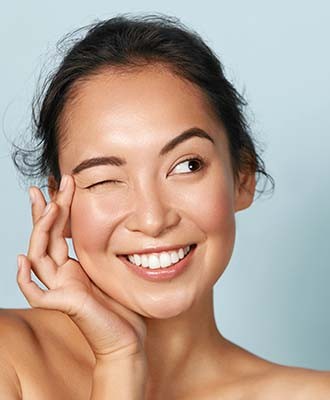Exploring Different Types of Collagen and Their Benefits
- By Yonboon Team
- September-25-2023
With multiple types of collagen available, it’s a bit hard to choose which collagen supplement is more suitable for your body.
Which supplement can offer effective and quick results?
Or what form of collagen you should take—powder? liquid shot? syrup?
This blog post will answer all of your questions, and help you pick the right type of collagen that will suit your lifestyle and individual needs.
Common Types of Collagen
The most abundant protein in your body is collagen, with approximately 28 distinct types. Type I collagen, found in tissues is particularly significant.
Type I collagen constitutes 90% of the collagen in your body playing a role because it:
- Provides support to connective tissues in your body
- Supports cellular communication allowing cells to multiply and perform their functions effectively.
- Facilitates cell movement helping in immune responses and wound healing
Other than type I collagen, the following types of collagen are present in the human body:
Type II: found in the joints
Type III: found in the skin and blood vessels
Type IV: present in the kidneys, eye lens and inner ear
The type and form of collagen supplements also play matter. Some supplements may contain one or two types of collagen for maximum benefits.
Let’s discuss each type of collagen and its benefits.
Type I Collagen
Among all types of collagen, type I collagen is the most abundant. This highly packed collagen naturally constitutes around 90% of the collagen content in the body.
The dermis layer of your skin consists primarily of type I collagen. It is a component in available supplements due to its extensive health benefits.
Moreover, sources like egg membranes, marine life and cows often contain Type I collagen. Recent research suggests that Type I collagen can support the nucleation and growth of bone mineral crystals within the body.
Read also: What Type of Collagen Is Best?
Type II Collagen
You can often find collagen type II in the form of loosely packed fibers in cartilage. It serves as a cushion, for your joints helping in movement and function.
This type of collagen is commonly used in supplements to support the system. The interconnected chains of acids that compose this collagen create a network of fibers.
Type II collagen plays a role in the strength and flexibility of cartilage essential for its ability to withstand strain and absorb impact.
Thus, taking type II collagen may help alleviate pain and strengthen bones.
Type III Collagen
Fibrillar collagen, also known as type III, is vital for our skin and internal organs. Types I and III collagens are often found together in certain parts of the body.
Similar to type I collagen, it is commonly found in supplements aimed at enhancing skin health.
Bovine collagen is another supplement option that mainly consists of types I and III collagens sourced from cows’ muscles, bones and skin. These two types of collagens are among the most abundant types in the body.
Type III collagen—present in bone, cartilage, bone marrow and connective tissue—often works well with type I collagen.
So, it may be ideal to consume supplements having both types.
Type IV Collagen
Type IV collagen is a less common protein, but responsible for proper functioning of the body.
It serves as filter for the skin layers, creating a barrier that keeps the organs from coming into contact with the skin.
This also helps in keeping certain chemicals and harmful elements entering the skin.
Collagen type IV is usually found in egg whites and shell membranes and is proven to improve skin health and healing process.
It also helps reduce wrinkle formation and other signs of premature aging.
Apart from its numerous benefits for the skin, type IV collagen is also essential for kidneys. As part of the basement membranes, it helps in filtering waste products and protecting against kidney injury.
Type V Collagen
As a component of collagen, type V collagen alongside type I collagen, synthesizes collagen fibers and plays a crucial role in regulating the overall growth of collagen fibers in connective tissue.
In the cartilage of joints, type V collagen works alongside type II collagen to support the integrity of type II collagen fibers.
Besides, type V collagen plays a role in forming the placenta, an organ that attaches to the lining during pregnancy. It also contributes to the formation of hair and cell surfaces.
Read also: Which Collagen Form is Right for You?
Type X Collagen
Healthy cartilage usually contains a protein known as collagen type X, commonly found in eggshell membrane collagens. Type X is recognized for its ability to form networks.
It provides rapid relief from joint pain if taken consistently for long term.
Scientific studies showed that in four weeks, it helps reduce crow’s feet and enhances skin tone after eight weeks. Alos, this form of collagen minimizes hair damage while promoting hair growth and thickness.
The Overall Benefits of Collagen
1- Collagen Plays a Vital Role in Skin Hydration
Collagen peptides help in keeping the skin hydrated providing moisture for a healthy and radiant appearance.
2- Improved Skin Elasticity with Collagen
Being a protein collagen supports the body tissues contributing to smooth and supple skin. Regular collagen intake has shown benefits in enhancing skin elasticity compared to those people who do not intake collagen.
3- Positive Effects on Mood and Sleep Quality
Studies suggest that collagen can positively impact mood sleep quality and productivity. Consuming glycine, found in collagen, has been associated with sleep quality by relaxing during REM sleep cycles and regulating body temperature.
Also, glycine contributes to mood enhancement properties when consumed through collagen intake.
By inhibiting neurotransmitters and boosting levels without affecting dopamine levels, it helps maintain a circadian rhythm.
Read also: Can I Put Collagen in Coffee? Know The Trends
4- Collagen Prevents Premature Aging.
As you age, your body naturally produces collagen leading to wrinkles and dry skin.
The collagen in your skin lowers the chances of developing wrinkles. It's worth noting that collagen is a proven anti-aging ingredient backed by scientific research.
What Are the Natural Sources of Collagen?
To boost your collagen levels naturally, consider consuming foods rich in animal tissue, such as:
- Fish
- Bone Broth
- Beef
- Chicken
- Meals containing gelatin
Here’s more, amino acids found in mushrooms, cottage cheese, leafy vegetables, lentils quinoa and beans also help your body produce collagen naturally.
How Can You Stop Collagen Loss?
With a few tweaks in your lifestyle and dietary habits, you can prevent immediate collagen loss from your body.
Protection from UV rays
Protecting your skin from UV rays is important to prevent collagen loss. Make sunscreen a part of your routine even on cloudy days when the sun isn't visible.
Make sure to use sunscreen with an SPF 30 or even higher if you are in an area with intense sun rays. It’s recommended to apply sunscreen three to four times a week to ensure you're getting enough vitamin D.
Wearing sunglasses with UV protection, hats and light clothing can also be beneficial.
Avoid smoking
Avoid smoking and exposure to secondhand smoke as it can affect collagen production.
Get enough sleep
Adequate sleep is crucial for collagen production; aim for eight to nine hours of sleep each night.
A balanced diet
Plan your meals carefully. Include a variety of fruits, vegetables, seafood, poultry and meat in your diet.
Stress free life
Managing stress is important for regulating collagen production. High stress levels can lead to collagen production due to increased cortisol levels.
FAQs
Which collagen is best for hair?
Type I and Type III collagens are great for promoting hair growth, strengthening hair follicles and enhancing luster. Yonboon marine collagen supplements, rich in amino acids and antioxidants, can help improve hair growth, strength and overall hair health.
Can you take Type 1, 2 and 3 collagen together?
Yes. When taken in combination, collagen types 1, 2 and 3 can effectively help improve function, skin elasticity and overall tissue health.
Which food has the most collagen?
The following foods are rich in collagen:
- Beef Bone Broth.
- Skin-On Chicken.
- Sardines.
- Collagen-Infused Drinks.
Which collagen is strongest?
Type I collagen found in humans (and other vertebrates) is the strongest and most effective type of collagen. It is found in bones, skin and tendons and is renowned for structural support to our body.
Which collagen makes you look younger?
Hydrolyzed marine collagen is known to prevent aging due to its bioavailability, easy digestion and quick absorption by the body.
Are collagen supplements suitable for all age groups?
Collagen supplements offer benefits for individuals of all ages. However, it is recommended to start taking them in your 20s to combat aging signs that may become more noticeable later on. If you are in your 30s, 40s, 50s, 60s or so, you should start taking collagen supplements regularly before it’s too late.
How long does it usually take to see results from collagen supplementation?
Most people start to see more obvious results after taking collagen supplements for three to six months. With regular intake of marine collagen, you can get improved skin elasticity, reduced wrinkles and fine lines, strong nails, and healthier and thicker hair.
Final Word
When you are choosing a collagen supplement, make sure it aligns well with your personal goals and body needs.
You can choose Yonboon marine collagen blend that is rich in collagen or collagen powder with vitamin C and added benefits.





